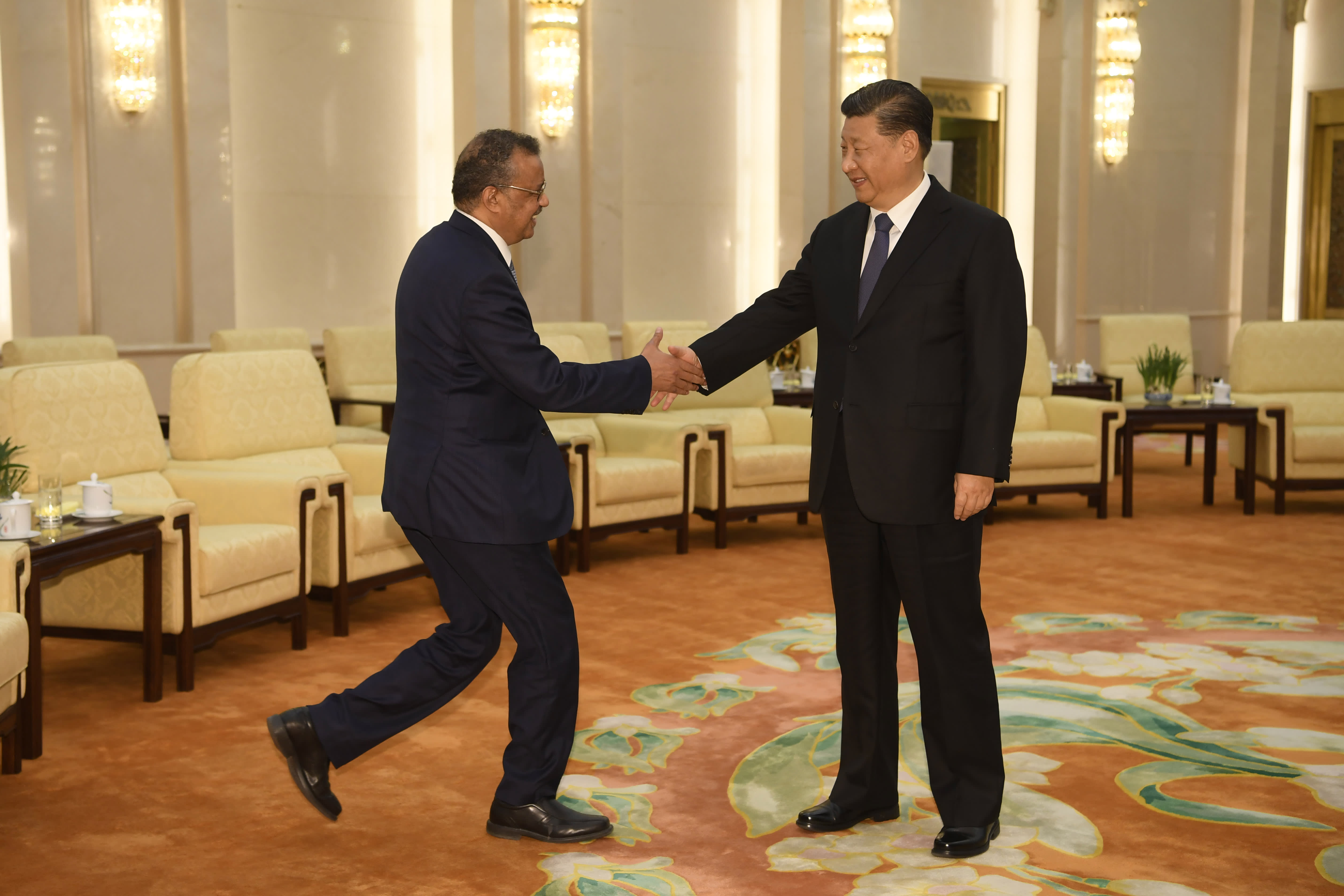
Tedros Adhanom, Director General of the World Health Organization, (L) shakes hands with Chinese President Xi Jinping before a meeting at the Great Hall of the People, on January 28, 2020 in Beijing, China.
Naohiko Hatta - Pool | Getty Images
Chinese President Xi Jinping has been visibly missing in action in Wuhan, the epicenter of the new coronavirus outbreak, spurring talk about his control from a distance in Beijing.
Instead, Xi dispatched his second-in-command, premier Li Keqiang to Wuhan on Jan. 27 in a shot of confidence for the city which has been under lockdown.
Since then, Xi has not been out much in front of the cameras, although he has been reported in state media as commanding efforts to contain the outbreak.
Most recently, Xi emerged from the shadows on Feb. 5 to meet with Cambodian leader Hun Sen who was on a state visit to China. Before this, the Chinese president had been absent from the limelight for over a week since Jan. 28 when he met with Tedros Adhanom Ghebreyesus, the director-general at the World Health Organization.
As the inner workings of the Chinese Communist Party are opaque, observers are weighing why Xi hasn't been to ground zero or playing up his role in managing the crisis.
"While Xi has claimed to be personally leading the effort from Beijing, and the division of labor between general secretary and premier often call for such a sharing of responsibilities, there is an undercurrent of sentiment that Xi's response has felt impersonal, more focused on avoiding a political calamity for the party than on the people's health," wrote analysts from risk consultancy Eurasia Group about the political cost for Xi in an outbreak situation that would "return to normalcy" by early April.
Xi is the general secretary of the Chinese Communist Party.
On China's heavily policed social media networks, there has been sparse discussion about the country's top leaders on a personal level, even in private chats.
Indeed, despite anger after "the tragic death of the doctor who first alerted the system to the disease, Dr. Li Wenliang, the brunt of negative sentiment has been focused on officials in Hubei (province) and Wuhan (city,) with little spillover to Xi or other leaders in Beijing," the Eurasia Group analysts wrote in their report on Sunday.
But Xi's absence from ground zero could be an attempt to protect the top leadership from the potential fallout of the health-care crisis, experts say.
"While Li is an extremely able manager and bureaucrat, he has long been sidelined by Xi and has come to be seen as relatively weak and feckless, leading to speculation that Xi has made Li a possible scapegoat if the virus is not soon contained," Jude Blanchette at the Center for Strategic and International Studies, a Washington-based think tank, wrote in late January.
"This is in keeping with other problematic policy areas, including U.S.-China relations, where Xi has opted to remain somewhat aloof, preferring to place deputies on the front line. If a crisis is averted, Xi can claim ultimate responsibility, but if problems arise, he can point the finger at lower-level officials," Blanchette added.
While the mayor of Wuhan will be the first in line to shoulder the blame from the fallout, "he is too low-ranking to be the scapegoat," said Volker Stanzel, a former German ambassador to China at a discussion hosted by the Mercator Institute for China Studies in late January.
Li also "symbolizes the will and the determination of the leadership of Xi Jinping to pull the whole responsibility towards the almost-very center, but not quite very center of the power structure," added Stanzel.
"He is not putting himself into the shoes of the person who is responsible for resolving this. He is taking the number two in the country—meaning he can always get rid of him and still remain Xi Jinping," he said.
Duration of the outbreak is important for Xi
The Eurasia Group analysts said in their note that a shorter scenario for the outbreak would cause "little blowback for Xi or other senior officials."
But, even in that scenario where there is a "return to normalcy" by March or April, Xi would still be "mildly exposed," said the Eurasia analysts.
An enduring outbreak though could be damaging to Xi.
"A poor handling of a months-long crisis and the economic stabilization program could well erode Xi's political capital as he prepares to stay on for a third term in office in 2022," they wrote.
"There is little reason to think Xi will face stiff challenges in doing so, but a seriously mishandled coronavirus crisis will increase the levels of uncertainty around political dynamics in China," the Eurasia analysts added.
The pressure on Xi is immense.
"If the epidemic continues to last or endures for a sustained period of time and citizens start to feel that the government is not handling it properly, President Xi could come under criticism, particularly given that it's the Politburo Standing Committee which is now taking charge of managing this epidemic," said Cedric Chehab, global head of country risk at Fitch Solutions, referring to the top echelon of the Chinese Communist Party.
"So in that sense, President Xi, if he doesn't resolve the epidemic, is unable to control it, could come under more pressure absolutely," Chehab told CNBC.
At the end of the day, success against combating the coronavirus "must be clearly the success of the central government; if not, someone very much at the top will have to be the scapegoat," said Stanzel.
https://news.google.com/__i/rss/rd/articles/CBMiamh0dHBzOi8vd3d3LmNuYmMuY29tLzIwMjAvMDIvMTAvY2hpbmFzLXhpLWppbnBpbmctaGFzLW5vdC1iZWVuLWluLXd1aGFuLWFtaWQtdGhlLWNvcm9uYXZpcnVzLW91dGJyZWFrLmh0bWzSAW5odHRwczovL3d3dy5jbmJjLmNvbS9hbXAvMjAyMC8wMi8xMC9jaGluYXMteGktamlucGluZy1oYXMtbm90LWJlZW4taW4td3VoYW4tYW1pZC10aGUtY29yb25hdmlydXMtb3V0YnJlYWsuaHRtbA?oc=5
2020-02-10 08:54:00Z
52780579291157
Tidak ada komentar:
Posting Komentar